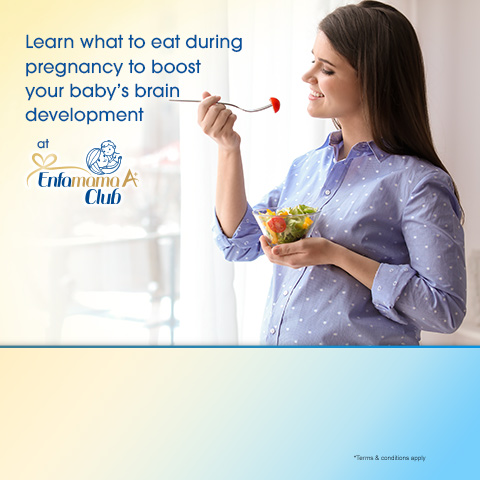 Help your baby develop in the fortieth week of your pregnancy
Help your baby develop in the fortieth week of your pregnancy
It’s week 40 of pregnancy and the big day is near. Continue to give your baby a healthy start in life by consuming foods rich in DHA and other essential nutrients.
What’s happening this week?
Your growing baby’s vision is still developing.
He or she will be able to focus on objects around eight to 10 inches (20 to 25 centimeters) from the face when he or she is borni; but don’t worry, this vision will develop further. Your little one may be familiar with your voice thanks to all the talking and singing you’ve been doing over your pregnancy period. The attachment between the mother and the child begins in utero (in the womb)ii.
Your little one may weigh between 7.6 pounds (3.5 kilograms) and measure 20.6 inches (51 centimeters)iii.
What can you expect?
Some babies might still be in the womb in week 40. Don’t worry; only five percent of babies arrive on their due dateiv.
Here’s how to support your pregnancy and baby’s health this week:
- Rest and conserve your energy for labor and all the feeding and diaper changing you’ll be doing.
- Talk to your doctor. Delivering your baby past 42 weeks may pose some complications, and your doctor may choose to induce labor.
- Take a peek ahead to your baby’s first weeks and milestones. Right after birth, your baby will experience rapid developments in these key areas – intellectual, motor, emotional, and communication.
What can you do to support your pregnancy?
Continue to provide your baby with DHA through your diet, to support his or her brain and eye development, as well as other nutrients like iron, zinc, choline and folate to support brain growth. Remember that both IQ and EQ development are anchored on the brain, and a balance between the two helps your child become future-ready.
Mums-to-be, this is the final week of your pregnancy and you are about to embark on a beautiful and exciting journey with your new family member. All the many ways you have been bonding with your baby throughout your pregnancy have undoubtedly set a strong foundation for your little one’s holistic development through his or her lifev.
Be prepared to feel an incredible rush of love for your little one soon after he or she is placed in your arms, as ‘love hormones’ such as oxytocin flood your bodyvi, further establishing that wonderful mother-child bond.

